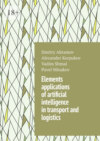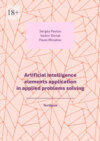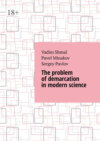Читать книгу: «Cartesian scientific paradigm. Tutorial»
© Sergey Pavlov, 2021
© Vadim Shmal, 2021
© Pavel Minakov, 2021
ISBN 978-5-0055-6696-6
Создано в интеллектуальной издательской системе Ridero
Introduction
One of the reasons Descartes is called the father of modern philosophy is because he set the agenda for those philosophers who came after him. Over the centuries, many thinkers have tried to interpret Descartes’ methods for their own purposes. This influence continues today.
Some philosophical problems will be familiar to people – say, the problem of knowledge or the problem of free will. The key question, however, is how to present these problems in a radically different way from Descartes’s in order to accommodate a philosophy of subjectivity that goes beyond the traditional concept of man as a thing that can be known.
Much has been written about the problem of Descartes’ knowledge. But more is needed to explain the role of subjectivity in Descartes’ thinking and how it influenced later philosophers. But I feel that this will become even more important in the future as the scale of the relationship between humans and the natural world will expand. Today we are experiencing a revolution in our understanding of the relationship between humans and the environment.
Among other things, this revolution is based on the discovery that the «natural» world (which Descartes considered a static environment, shaped by God) is in fact a dynamic, changing in an increasingly complex way. From wildfires and the rise of agriculture to the introduction of agriculture into livestock and human industries, we are constantly changing the environment in countless ways.
Descartes’ model of the natural world implies that we are trapped in predetermined deterministic rules of the natural world. Today, many people believe that they have escaped from this control, and can chart their own course in the world, guided by reasons, feelings and memory.
Descartes’ views on the subjectivity of reason guided philosophers who tried to find the meaning of freedom. Spinoza argued that we are free to act, because reason compels us to do so. If we can do this, we are free. But Spinoza also said that since reason is the vehicle of free will, free will has a natural source – or at least a source that we can turn to. And Descartes’ own opinion that the feeling «I am» or what in Hegel’s philosophy is called «withdrawal» is essential for this understanding of freedom.
Thus, Descartes’s views on the subjectivity of reason inspired a wide range of thinkers. But they were also taken quite differently by philosophers who continue to hold Descartes’ views of man as a thing that can be known. One of them, the philosopher Abraham Kuyper, argued that «the sensible existence of a person is just a case of his awareness, conceived in his own consciousness, that he exists existentially». In other words, my being has a certain meaning, and I am happy to know that.
In fact, Kuyper believed that knowing that I existentially exist was critical to my freedom – and to all other people – because knowing my existence prompts me to act. According to his version of Descartes, the world is fixed and given; I do not just exist, but I can think and act freely. I do not just exist, but I know my existence and free will.
Thus, the description of the world as a fixed and given subjectivity is at the heart of Kuyper’s philosophy. He himself would call his philosophy «idealistic realism» (also called «subjectivism»).
But although Descartes has always been unpopular in philosophy, he enjoyed some support from other thinkers, in particular Immanuel Kant, who actually wrote a commentary on Descartes’s thinking. Kant’s commentary, however, does not address the philosophical problems posed by Descartes’ philosophy. Rather, he argues that what Descartes saw as" cogito ergo sum" was not something that the philosopher had to convince himself of as much as he had to convince the world of the validity of his ideas. Thus, according to Descartes ' axiom, the philosopher «does not rule the world and does not question it. For the world rules him.»
The philosophy of Descartes is a philosophy that is sometimes called Cartesianism, Cartesian dualism, or Cartesian philosophy. As Rene Descartes put it, the main direction of Cartesian philosophy is the understanding and use of reason as a source of knowledge, understanding of natural law and the practice of the scientific method, which, showing the power of the mind, seeks to gain true knowledge. He considered himself the first true philosopher and the first «true scientist.» His famous physics is rooted in medieval Arab philosophies of the corpuscular method and their distinction between mathematics (which is limited to understanding the natural order) and physics (which is unsystematic and therefore capable of predicting the behavior of the world around us), and the theory of conservation of energy. His analysis of the mind and the nature of the mind, as well as the direct analysis of the mind by the mind, are central to Descartes’ philosophy. Descartes developed a theory of ideas, which he called the commotive of ideas. His philosophy is thus often considered a corpuscular version of the Irish philosopher John Buridan of the tradition of atomism and Plato’s philosophy of mind.
Descartes’ philosophy was well known by the 18th century and was used primarily by the founders of the scientific revolution. Georges Lemaitre used Descartes’ debate method in his study of wave mechanics. Joseph Butler strongly criticized Cartesianism and stated that Descartes was forced to conclude that the mind is simply a material function of the brain and body, and argued that Descartes had no legal basis to deny the existence of spirits because many of the great writers of the Catholic Church have argued. However, the classical concept of Descartes as a proto-scientist was discredited by Immanuel Kant, a German philosopher who worked with clearly anti-Cartesian views.
Descartes’ philosophy focused on the concept of dualism, and his goal was to arrive at an explanation of the nature of mind and how it works. It was based on the idea of dualism, the distinction between physical and mental, or between mind and body, as opposed to a consistent monistic science. In the second meditation, Descartes argues that when people discuss something with another person, the way they speak and move is determined by the body, whereas the mind is associated with thoughts. In Meditation Three, Descartes discusses the purpose of the mind, claiming that it is an impartial observer who collects and displays information.
Descartes suggested that the mind has the following characteristics:
the soul (consciousness) is divided into two parts: the intellect (besides the higher thought) and the body;
mind and body are separate but not different;
the mind has a twofold power: reasoning and perception;
there is one mind (mind and soul), but two bodies, one of which is immaterial;
the mind can imagine a material body and use it as if it were its own, but cannot cause it to appear;
mind and body are separate and yet indistinguishable from each other, so the mind does not belong to the body, and yet the body does not belong to the mind.
Descartes further argued that when people imagine the body, they represent it in terms of its materiality (it has bones and flesh). When they imagine mind, they consider it intangible. Therefore, the mind, says Descartes, should be considered as possessing the same qualities of thought and perception as the material body, and the mind and the material body were created by people, since they were created by God. Descartes also argues that mind and body can be detached and then put back together. This idea, known as dualism, was later taken up by later philosophical systems such as determinism and materialism.
Descartes also believes that each part of the mind has its own existence and its own nature. For this reason, he opposed pantheism and called the one indivisible God mind. Descartes believed that the mind is not a material substance like a body, but, on the contrary, the possibility of realization.
Descartes’s views were based on the writings of his predecessor, Scotus Eriugena, but also required a lot of research on the part of Descartes. His decision to limit his research to the psychic life led to the development of Cartesianism. To explain reason, Descartes developed a set of «requirements for incompatibility between mind and matter» (rational thinking and concrete objects). The basis for this disagreement is that Descartes and some of his predecessors considered matter to be a universal substance, while others thought that mind was a universal substance.
Intelligence
Descartes believed that what people experience is based on what is happening in their brain. He believed that when people think something, the thought moves through the nerves and muscles of the head until it reaches the conscious mind. For this reason, he believed that there is a mind and a body, and that each of them has its own existence, since he believed that the soul is both material and immaterial. As a result, the concept of dualism plays a vital role in his thinking, and he argued that matter is the only substance, while matter and spirit are separate and not completely complementary. In the Third Meditation, Descartes describes how if someone looks at their hand and thinks it is a hand, then they perceive the subjective impression of the hand. This led him to believe that mind and body are not one but two parts of the mind, so that the mind cannot cause the body to appear, but the body can cause the mind to appear. Descartes believed that the ability of the body to cause the emergence of mind is the basis of the idea of free will. Descartes wrote that he still believed in free will. Descartes argued that the mind can determine the will. And this decision to do something is made freely, because the mind in its «logical and systematic procedure» generates a logical conclusion based on the premises of the situation. Descartes wrote that the mind has the power to make will because of its ability to generate a logical conclusion based on the facts of the present. The ability to form a will depends on intelligence and reason. The mind determines what it considers to be good reasons for decisions. Moreover, the mind can distinguish between different criteria and is not able to make decisions based only on knowledge. Descartes’ reflections on free will have been quoted in the debate on libertarianism.
According to many readers of his work, Descartes adhered to Aristotelian epistemology. He viewed the mind as a form of thinking in which physical objects are different, mental qualities are either definite or indefinite, and what seems real is necessarily related to what is possible. Descartes suggested that the object is a separate body, consisting of atoms of an undefined nature. Descartes rejected the monistic doctrine that mind and body are one because, in his opinion, two bodies without mind were not enough to explain the relationship between two people.
Descartes also believed that all entities, whether physical, mental, or both, are bound by «definite and implacable laws». He believed that no entity is completely independent, because the mind is not immune from the laws of the world. Body and mind are inseparable. Descartes believed that one can become aware of something that is not aware of itself. He suggested that one day the conscious mind will become aware of its true nature.
Without direct access to «other minds», we must, based on the behavior of others, conclude that their personal mental life is similar to ours. This conclusion became a kind of epistemic reflex. According to the philosopher John Searle, this has led to one of the most enduring beliefs in modern intellectual life: after all, we are not limited in our consciousness only by ourselves. This may not be the case. We have minds that are capable of performing truly intelligent reasoning and seeing things in truly mysterious ways, and they are probably superior to our own, and they too can be used to understand and improve our lives. They may not be as effective as we are. The only reasonable position on this issue is that our minds are as smart as possible, and in some ways better.
Take intelligence, for example. The fact that we, by and large, have minds equal in general capacity to our own is clearly not a good sign that these minds are similar enough to ours that we can have similar experiences or understand each other. As Searle put it, «To say that we are essentially ’the same animal’ in a certain respect means nothing at all». He has a simple answer to the seemingly outrageous assertion that we can know ourselves in relation to another human being, namely: «As for the assertion that we can know one human being in relation to another human being, I’m quite prepared to say, that such knowledge is absolutely useless».
You may not find this point of view entirely clear, but it is nonetheless an important finding, even if Searle is to qualify it with the remark that he is willing to discard it on the grounds that, being «similar enough», really useless, that is, it actually does not contribute to the accumulation of knowledge. You and I may be perfectly capable of doing intelligent things such as reading or listening, or making decisions on difficult, vague, and potentially conflicting issues, but our special abilities can never justify us, even in relation to someone who, in their queue, as smart as we are. Anyone who wants to claim that we are really equal or «are the same animals», after long and persistent reflection, had to come to the conclusion that our minds are radically different and simply fundamentally incomparable.
But here another interesting question arises. It would be easy to view this differentiation as proof that the human mind has abilities that we do not share with any animal. But Searle sees that is not the point.
It may seem that I have a little roughly characterized Searl ’s position as a position that is in the spirit of utilitarianism, as a determination to maximize the overall well-being of humanity. But he truly believes that this «sane maxim» should guide the thinking of everyone involved in a project to improve the well-being of people, from the highest courts to ordinary citizens, with the goal of building a future that will be as rich and interesting as the one we can imagine now. According to him, all those who followed Searle’s example and supported the project of theorizing about «collective unconscious» and «symbolic thinking» were forced to do so because they are convinced that they are looking for ways to expand human power. But it also means that they have to be willing to say no to certain things when they are faced with the opportunity to make humans more and more superior to other animals. It is an area of research that, he says, is not related to the question of whether we are «better» than other animals, but rather to how we should avoid «all possible threats to our own growth and the growth of our offspring, including threats our intellectual achievements».
Indeed, as Searle has often pointed out, there is not a single animal that knows why it exists. And we, who truly know why we exist, he argues, must pay the price for being so smart and capable. He says we should not allow ourselves to fall in love with our powers and our tendency to regard our minds as unique. We must remember that what sets us apart from other animals is simply our mind.
Discussing man as a «rational animal», Descartes said: «A rational animal does not in any way correspond to the conditions of man, since it is as superior and independent of him as his imagination is independent of him». Descartes considered the mind above the body and in such a way that it could exist without the body, although he did not want to make a specific distinction between mind and soul, as well as mind and body. In Discourse on Method, Descartes gave an example of such a way of thinking. He argued that the process of creating an object is essentially the same for creating an object in the mind and creating in the physical world. Descartes said that we should not think of the mind as a separate substance, as Plato would like us to do, but we should not attribute to the mind the ability to create the physical world. «The essence of this great whole, so far from being something absolute, is in fact a multitude of different things connected together by the smallest connections, but united by many small differences».
We should be divided into mind and body, but Descartes wanted to stick to the idea that the body is not a physical substance, as materialism claimed. We can think of the mind as an intelligent being or thinking object and consider that the mind has no material substance. We can consider that the mind is superior to the body in its capabilities. However, the mind has a material part of its reality. Descartes discussed the fact that «although we are in a state of contemplation, nevertheless, in fact, we are in a state of bodily existence,» but he made it clear that «all the organs of the body are still there and move in accordance with immutability. the nature of the mind or soul». Thus, the body does not cease to exist, and we can think of the mind as created from the body, which in a sense is. Descartes said: «The soul is not the only thing, but it is a substance that has intelligent powers that make up the body, which, again, is the soul».
To achieve his rational goal, Descartes rejected materialism. This meant that Descartes rejected both the idea that the body is a material substance and that the mind is separate from the body. Descartes understood materialism as the point of view according to which the body is a material substance, that the mind is different from the body and that the body has nothing to do with the mind. Descartes believed that in a sense, the mind is not a separate substance, but a substance that exists in the body. To say that the body is material, Descartes believed, means to say that the mind is not a rational thing, but a thing that can be controlled with the help of the body. In other words, the mind is a rational entity that can be viewed as separate from the body. In his Treatise on Method, Descartes said: «One thing cannot think of another thing independently». Descartes considered reason as one substance, rational. Descartes argued that if mind were a separate substance, then we could create ideas about other things and things other than mind. This would be impossible for the mind, because the mind is essentially a body. «It is necessary that the mind, as the rational faculty of the body, belong to the body; that it, and not the body, was the substance of the mind; that it is a material part of the body; and that he should be a part of the body, like that part of the body that consists of rational faculties».
As I mentioned earlier, Descartes did not adhere to the idea that the mind is a separate substance from the body. This is a decisive moment in Descartes’ understanding. When he discussed mind and body, he insisted that there was a difference between the two. He believed that the mind is a rational thing, but inseparable from the body. Rather, the body is an effective cause, a tool that the mind uses to achieve its goal. «The relationship of things to each other is always determined by the nature of things. It is intelligence to produce what is in the mind, what makes them change, what makes them exist». Mind and body are intelligent things, but not separate substances. Descartes believed that although we can think of mind and body as if they were separate substances, mind is the effective cause of the body. The mind is the inner force that exists in the body and through which it is built. An essential part of Descartes’ understanding of mind is that mind and body are not separate substances. This is not to say that mind and body are separate substances. They are one and the same substance. In a sense, the body is simply a tool that is used to help the mind achieve its goal.
These are words that we know come from the Latin verb rerum (asire in English). Feelings alone, and also only imagination, will not do anything, neither see, nor hear, nor think, but must be connected together with the intellect (lat. Intellectus), and they will be ready to produce sensation. For example, if you want to find out whether there are two things or not, you have to reason to do so: the mind, which is of the same nature as the imagination, will cause the sensation of the existence of two things; because a reason alone, if you set it up to conjure up a sensation, will cause both sensation and doubt; but doubt alone has its own nature. The difference between existing and non-existent things is this: every thing that exists has a cause, and every thing that does not exist has no reason. Therefore, there is a reason for everything that exists, and there is no reason for everything that does not exist. So, this reason has existed from eternity; for each cause, it is already present and remains after a series of things: for example, those things that were caused come to their end and die. Therefore, this cause of things exists from eternity, and this cause of things does not exist only from time.
In the second part of the Treatise on Man, Descartes develops the concept of reason, which combines reason, imagination and thought. This is the first attempt by modern philosophy to develop a theory of mind, because, in addition to believing in what is believed to be true, the object must also judge whether it possesses that property. Descartes’ theory does not attempt to create an object called the «comprehensible world» that does not depend on the mind that perceives it, but rather represents the mind’s perception of the transcendental mind.
Бесплатный фрагмент закончился.





















